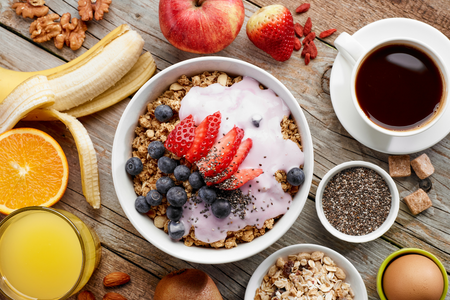Feeling blue? Depression can make your body feel dull, heavy, enervated and drowsy.
One day, while in the agony of a good old-fashioned dark-rain-cloud depression, you wake up and feel stuck like you have been glued to your flat emotional landscape like a little moth on flypaper
Doctors may suggest you certain self-care treatment and antidepressant medication but they may prove to be a failure and you may become more bereaved. But a little lifestyle changes can help you to fight against the despondency. Lifestyle and health go hand in hand and there are two substitutes of reducing depression- Right Diet and Workout. There is overwhelming benefits of a healthy diet and changing lifestyle, preventing cardiovascular disease, cancer, dementia, and mental health disorders, including depression.
Nutritional therapy
Changing your diet can be a great annexation to traditional therapy, like CBT and medication, but it comes at a much smaller cost and can be a great way to self-care. What it boils down to is that what we eat matters for every aspect of our health, as well as our mental health. Several recent research scrutinized multiple studies which support that there is a link between what one eats and our risk of depression.
A dietary pattern is characterized by a high intake of fruit, vegetables, whole grain, seeds and nuts, with some proteins rich foods like fish, yoghurt, olive oil, soy products, low-fat dairy and antioxidants and low intakes of animal foods was apparently associated with a decreased risk of depression and boost alertness.
On the other hand, a dietary pattern which characterized by high consumption of red and/or processed meat, refined grains, sweets, high-fat dairy products, caffeine, butter, potatoes and high-fat gravy, and low intakes of fruits and vegetables is associated with an increased risk of depression. Balance your mood and prevent depression by also eating the following foods:
- B12 and folate prevent mood disorders and dementias: beetroot, lentils, almonds, spinach, liver (folate); liver, chicken, fish (B12)
- Vitamin D deficiency is associated with different mood disorders: sun exposure; breakfast cereals, bread, juices, milk; high-quality supplements for men and women
- Selenium decreases depression: Nuts, walnuts, poultry.
- Add Omega-3 in diet: More recent studies have shown that there is a relation between mental health and Omega-3 Fat acid. Studies show that people who don't often eat fish, a rich source of these fatty acids, are more likely to have depression. Wild-caught fish, specifically the more oily types such as salmon, mackerel, trout and sardines are great choices to help fight depression because they are rich sources in Omega-3 fats. Omega-3 fats help to build connections between brain cells as well as build and strengthen the receptor sites for neurotransmitters.
Many a times diet may work slower and does not provide the desired result then supplementation with Omega-3 Fish Oil will serve you which helps in reducing depression and has anti-inflammatory effects. It is unique among other fish oils for its critical extraction, purity, bioavailability and concentrations.
Tailoring Exercise to Treat Depression
When you have depression or anxiety, exercise often seems like the last resort anyone would do. Exercise can make a big difference, once you get motivated. Frequent Work-out helps prevent and improve a number of health problems, including high blood pressure, diabetes and arthritis. Studies on the relation between depression, anxiety and exercise reveal that the psychological and physical benefits of exercise can help improve mood and reduce anxiety.
Depression is evidenced physically by causing disturbed sleep, reduced energy, increased craving and appetite changes, body aches, and increased perception of pain, all of which can result in less motivation to exercise. It's a hard cycle to break. Some have used the expression “fake it until you make.” We found out some ways to charge yourself and overcome the barrier of de-motivation:
- Set Off That Runner's High
Morphine released by a special gland in our brains in response to physical activities which can produce a sense of well-being or joy and also decrease pain levels.
- Start yoga
Eastern traditions such as yoga have a wonderful antidepressant effect in that they improve resilience; involve mindfulness, which breaks up repetitive negative thoughts; increase strength; make you aware of your breathing; improve balance, and contain a cogitative component. Studies say that women suffering from depression and anxiety took a yoga class twice a week for a month or more.
- Get Your Walk On
Practical wisdom suggests that doing something is better than doing nothing in terms of physical activity. Walking is very much effective if done regularly. If you are not comfortable to walk alone contact with a friend, it can be a great source of emotional support and benevolence. Meeting with a friend can be a great way of combining casual social interaction with balanced physical activity.
- Pump the Iron
Lifting weights does more than just increase of muscle mass, its increase testosterone levels, increase metabolic rate and motivate you to eat well. Low testosterone levels have been linked to fatigue and depression in men. Lifting weights for 45 min, 3-4 times a week can raise your testosterone level.
For a few days, you will think you are going to die due to sudden switch but after a few days, you will start noticing energy level soaring. Don’t go so hard on yourself, the above suggestions for moderate exercise can be started off in small feasible chunks for just a few minutes each, else the anticipation of future exercise which again takes up lots of time and energy may be enough to put you off any more attempts.






